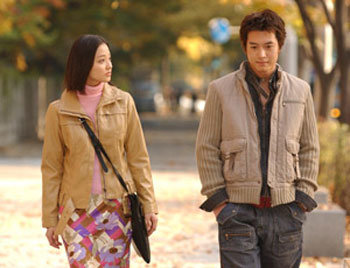Love Story of Japanese Male and Korean Female
Love Story of Japanese Male and Korean Female
Posted January. 26, 2004 23:28,

Why do all the male protagonists of TV dramas co-produced by Korea and Japan always happen to be Koreans and why do the all heroines happen to be Japanese?
Stars Echo, which will be aired on MBC at 9 p.m. Friday, is the third T.V. drama jointly produced by Korea and Japan, and the story is centered on the love between a Korean male principal actor Seong-jae (Cho Hyeon-jae) and a Japanese female counterpart Misaki (Nakagoshi Noriko). Misaki, who lives her life in guilt of killing her lover in a traffic accident, is transferred to a Korean branch and there she meets Seong-jae, who helps her cure her wounds of the past memories with love.
The drama was co-produced by MBC and Fuji TV and will be also aired in Japan at 9 p.m. Friday.
One interesting thing worth to take notice of is that all the heroes of the Korea-Japan co-produced TV dramas, including Friends (2001) and Afternoon after a Shower (2002), are Korean while all the heroines are Japanese.
This is largely because Koreans still have hostile feelings against the Japanese.
Korea is a country once colonized by Japan, and Koreans have a negative image of Japanese males, particularly on their sex trips. So it would be too early to make a soap opera whose principle male character is Japanese and the female principal character is Korean, said Park Jong, director of the drama department at MBC.
However, some point out that all the co-produced dramas have been clichéd fairy tale stories. They argue that the jointly produced dramas have been no more than unrealistic melodramas, failing to depict passionate yet complicated relationship and emotions of the lovers. In fact some of those who watched the preview of the Stars Echo say that it is very stereotyped.
As the relations between Korea and Japan are volatile as we can see from the dispute over Dokdo Island, we can only show a fairly-tale level of love stories at the moment, said Kim Nam-won, a program director.
So far we put emphasis on co-production itself, but now it is time to garner efforts to produce higher quality work, director Park said.
kathycho@donga.com





![[이진영 칼럼]잘난 韓, 못난 尹, 이상한 張](https://dimg.donga.com/c/138/175/90/1/wps/NEWS/IMAGE/2026/01/20/133198367.1.jpg)

